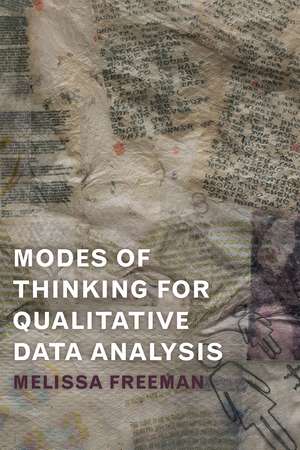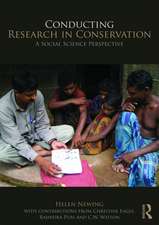Modes of Thinking for Qualitative Data Analysis
Autor Melissa Freemanen Limba Engleză Paperback – 20 sep 2016
| Toate formatele și edițiile | Preț | Express |
|---|---|---|
| Paperback (1) | 308.93 lei 43-57 zile | |
| Taylor & Francis – 20 sep 2016 | 308.93 lei 43-57 zile | |
| Hardback (1) | 996.33 lei 43-57 zile | |
| Taylor & Francis – 14 sep 2016 | 996.33 lei 43-57 zile |
Preț: 308.93 lei
Nou
Puncte Express: 463
Preț estimativ în valută:
59.13€ • 64.25$ • 49.70£
59.13€ • 64.25$ • 49.70£
Carte tipărită la comandă
Livrare economică 21 aprilie-05 mai
Preluare comenzi: 021 569.72.76
Specificații
ISBN-13: 9781629581798
ISBN-10: 1629581798
Pagini: 154
Ilustrații: 1 figure, notes, references
Dimensiuni: 152 x 229 x 20 mm
Greutate: 0.22 kg
Ediția:1
Editura: Taylor & Francis
Colecția Routledge
Locul publicării:Oxford, United Kingdom
ISBN-10: 1629581798
Pagini: 154
Ilustrații: 1 figure, notes, references
Dimensiuni: 152 x 229 x 20 mm
Greutate: 0.22 kg
Ediția:1
Editura: Taylor & Francis
Colecția Routledge
Locul publicării:Oxford, United Kingdom
Public țintă
PostgraduateCuprins
Contents
List of Tables and Figures
Preface
On Tradition
On Reflexive Dialogical Practice
Final Thoughts
List of Tables and Figures
Table 1.1: Modes of Thinking for Qualitative Data Analysis page xx
Table 4.1: Two Approaches to Dialectical Thinking in Practice page xx
Figure 1.1: Modes of Thinking in Dynamic Relation page xx
Figure 2.1: Connecting Categories to Concepts page xx
Figure 3.1: Dimensions of Plot page xx
Figure 4.1: Dialectical Friction and Emergence page xx
Figure 5.1: Poetics as Infinite Dialogue page xx
Figure 6.1: A Phenomenon Becoming page xx
List of Tables and Figures
Preface
- Introduction
Why Focus on Analysis?
Thinking, not Thought
Brief Introduction to the Modes of Thinking
Modes of Thinking for Qualitative Data Analysis
The Modes of Thinking in Dynamic Relation - Categorical Thinking
Introduction to Categorical Thinking
Characteristics of Categorical Thinking
Categorical Thinking in Practice
Deciding on Categorical Thinking for Analysis - Narrative Thinking
Introduction to Narrative Thinking
Characteristics of Narrative Thinking
Narrative Thinking in Practice
Deciding on Narrative Thinking for Analysis - Dialectical Thinking
Introduction to Dialectical Thinking
Characteristics of Dialectical Thinking
Dialectical Thinking in Practice
Deciding on Dialectical Thinking for Analysis - Poetical Thinking
Introduction to Poetical Thinking
Characteristics of Poetical Thinking
Poetical Thinking in Practice
Deciding on Poetical Thinking for Analysis - Diagrammatical Thinking
Introduction to Diagrammatical Thinking
Characteristics of Diagrammatical Thinking
Diagrammatical Thinking in Practice
Deciding on Diagrammatical Thinking for Analysis - Teaching Qualitative Analysis
On Tradition
On Reflexive Dialogical Practice
Final Thoughts
List of Tables and Figures
Table 1.1: Modes of Thinking for Qualitative Data Analysis page xx
Table 4.1: Two Approaches to Dialectical Thinking in Practice page xx
Figure 1.1: Modes of Thinking in Dynamic Relation page xx
Figure 2.1: Connecting Categories to Concepts page xx
Figure 3.1: Dimensions of Plot page xx
Figure 4.1: Dialectical Friction and Emergence page xx
Figure 5.1: Poetics as Infinite Dialogue page xx
Figure 6.1: A Phenomenon Becoming page xx
Notă biografică
Melissa Freeman is Professor of Qualitative Research Methodologies in the College of Education at The University of Georgia.
Recenzii
"We’ve long needed this book, a book which would take students and scholars alike through the complex process of doing qualitative analysis. Melissa Freeman’s Modes of Thinking for Qualitative Data Analysis meets these needs. Its creative, comparative focus on forms of thinking, from categorical, to narrative, dialectical, poetical, diagrammatical, opens new windows on how to interpret empirical material." – Norman K. Denzin, University of Illinois, Urbana-Champaign
"Melissa Freeman has developed a compelling typology for understanding qualitative work... Her work counters the standard classifications which connect methods with a particular methodology or tradition and leads to confusion. Instead, she argues persuasively, and with examples, that for a truly reflexive stance and a critical understanding of research, researchers must engage in "pentimento," or must see again, to understand essences and create innovative possibilities." - Lynn Butler-Kisber, McGill University
"Melissa Freeman has developed a compelling typology for understanding qualitative work... Her work counters the standard classifications which connect methods with a particular methodology or tradition and leads to confusion. Instead, she argues persuasively, and with examples, that for a truly reflexive stance and a critical understanding of research, researchers must engage in "pentimento," or must see again, to understand essences and create innovative possibilities." - Lynn Butler-Kisber, McGill University
Descriere
Modes of Thinking for Qualitative Data Analysis argues for engagement with the conceptual underpinnings of five prominent analytical strategies used by qualitative researchers: Categorical Thinking, Narrative Thinking, Dialectical Thinking, Poetical Thinking, and Diagrammatical Thinking.












